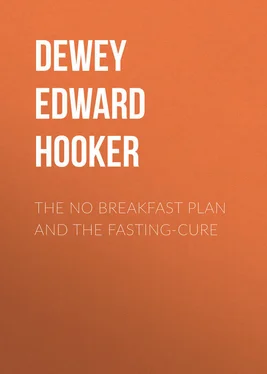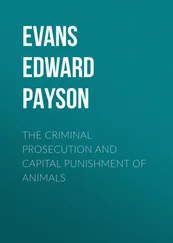Edward Dewey - The No Breakfast Plan and the Fasting-Cure
Здесь есть возможность читать онлайн «Edward Dewey - The No Breakfast Plan and the Fasting-Cure» — ознакомительный отрывок электронной книги совершенно бесплатно, а после прочтения отрывка купить полную версию. В некоторых случаях можно слушать аудио, скачать через торрент в формате fb2 и присутствует краткое содержание. Жанр: foreign_antique, foreign_prose, на английском языке. Описание произведения, (предисловие) а так же отзывы посетителей доступны на портале библиотеки ЛибКат.
- Название:The No Breakfast Plan and the Fasting-Cure
- Автор:
- Жанр:
- Год:неизвестен
- ISBN:нет данных
- Рейтинг книги:3 / 5. Голосов: 1
-
Избранное:Добавить в избранное
- Отзывы:
-
Ваша оценка:
- 60
- 1
- 2
- 3
- 4
- 5
The No Breakfast Plan and the Fasting-Cure: краткое содержание, описание и аннотация
Предлагаем к чтению аннотацию, описание, краткое содержание или предисловие (зависит от того, что написал сам автор книги «The No Breakfast Plan and the Fasting-Cure»). Если вы не нашли необходимую информацию о книге — напишите в комментариях, мы постараемся отыскать её.
The No Breakfast Plan and the Fasting-Cure — читать онлайн ознакомительный отрывок
Ниже представлен текст книги, разбитый по страницам. Система сохранения места последней прочитанной страницы, позволяет с удобством читать онлайн бесплатно книгу «The No Breakfast Plan and the Fasting-Cure», без необходимости каждый раз заново искать на чём Вы остановились. Поставьте закладку, и сможете в любой момент перейти на страницу, на которой закончили чтение.
Интервал:
Закладка:
The head is the power-house of the human plant, with the brain the dynamo as the source of every possible human energy. We think, love, hate, admire, labor with our hands, taste, hear, smell, see, and feel through the brain. Broken bones and wounds heal, diseases are cured through energy evolved in the brain or the brain system as a whole. The other so-called vital organs and the muscles are only as so many machines that are run by the brain power, with the stomach an exceedingly important machine. That powers so rare do not originate in the bones, ligaments, muscles, or fats, does not need argument; that when the nerve-trunks that supply the arm or leg are severed power of movement and feeling is lost, is known to all; and equally would the power of the stomach be abolished were the nerve-trunks cut off. In a general way, then, it may be stated that the strength of the body is directly as the strength of the brain.
With this physiology, who in or out of the medical profession can fail to see clearly that the digestion of even an atom of food is a tax upon the strength of the brain for whatever of power needed by the stomach, the machine, for this purpose? Unless it can be proved that the stomach has powers not derived from the brain system, this will have to be admitted.
How is the strength kept up in the light of this physiology? The universal belief is that it is kept up by the daily food. In proportion to the prostration of sickness, so are physicians anxious to conserve the energies by working the stomach to the limit of its powers.
The impression that there must be something digested to support the vitality of the system is a belief, a conviction that has always been too self-evident to suggest a doubt.
If the well need food to keep up the strength, the sick need it all the more; this is the logic that has been displayed upon this question. Let us keep it clear in mind that, if the nerves going to the stomach are severed, paralysis will result as in the case of the arm, in order more definitely to conceive the stomach as a machine that requires power to run it even to a tiringout degree. This is strikingly illustrated by the exhausted feeling that invites the after-dinner nap for rest, which, however, does not rest overfilled stomachs, overfilled brains. The brain gets no rest while getting rid of food-masses with more of decomposition than of digestion.
If food really has power to keep up the strength, there should not be so much strength lost by the general activities – indeed, it would seem that fatigue should be impossible. But the fact remains that from the first wink in the morning to the last at night there is a gradual decline of strength no matter how much food is taken, nor how ample the powers of digestion; and that there comes a time with all when they must go to bed, and not to the dining-room, to recover lost strength. The loss of a night of sleep is never made up by any kind of care in eating on the following day, and none are so stupid as not to know that rest is the only means to recover from the exhaustion of excessive physical activity.
The brain is not only a self-feeding organ when necessary, but it is also a self-charging dynamo, regaining its exhausted energies entirely through rest and sleep. There is no movement so light, no thought or motion so trivial, that it does not cost brain power in its action – and this is true of even the slightest exercise of energy evolved in digestion.
Why, then, do we eat?
For two reasons, or perhaps three: we eat because we are hungry. We rarely fail to eat excessively to satisfy the sense of relish after the normal hunger sense has been dissipated; we may eat to satisfy relish as we eat ice cream, fruits, and the enticing extras that beguile us to put more food into the stomach after it is already overfilled for its working capacity. But our actual need of food, the best reason for taking it, is to make up for the wastes from the general activities; and this is a process in the order of Nature that actually tires the entire brain system, or, in the common phrase, the whole body, unless the stomach has powers not derived from the brain system.
Now as we need not, cannot feed the brain in time of sickness, what can we feed? In all diseases in which there are a high pulse and temperature, pain or discomfort, aversion to food, a foul, dry mouth and tongue, thirst, etc., wasting of the body goes on, no matter what the feeding, until a clean, moist tongue and mouth and hunger mark the close of the disease, when food can be taken with relish and digested. This makes it clearly evident that we cannot save the muscles and fat by feeding under these adverse conditions.
Another very important, unquestioned fact is that disease in proportion to its severity means a loss of digestive conditions and of digestive power.
Cheer is to digestion what the breeze is to the fire. It may well be conceived that there are electric nerve wires extending from the depths of the soul itself to each individual gland of the stomach, with the highest cheer or ecstacy to stimulate the highest functional activity, or the shock of bad news to paralyze. From cheer to despair, from the slightest sense of discomfort to the agony of lacerated nerves, digestive power goes down. Affected thus, digestive power wanes or increases, goes down or up, as mercury in a barometer from weather conditions.
Digestive conditions in their maximum are revealed in the school-yard during recess, when Nature seems busy recovering lost time.
How compares the ramble of a June morning, with the blue and sunshine all above, the matchless green of the trees, and all the air fragrant with the perfume of flowers and alive with music from the winged singer, in digestive conditions, with those in the rooms of the sick, where there is only distress felt in the body and seen in the faces of the friends?
In time of health, if we eat when we are not hungry, or when very tired, or in any mental worriment, we find that we suffer a loss of vital power, of both physical and mental energy. How, then, can food be a support to vital power when the brain is more gravely depressed by disease? Yet from the morning of medical history the question of how vital power is supported in time of sickness has never been considered, because there has never been any doubt as to the support coming from food. I assume this to be a fact, since all works on the practice of medicine of to-day enjoin the need to feed the sick to sustain their depressed energies – all this without a question as to whether there is not a possibility of adding indigestion to disease when food is enforced against Nature's fiat.
Since vital power is centred in the brain, do we need to feed, can we feed, for other than brain reasons? This physiology admitted, there is no other conclusion possible than that feeding the sick is a tax on vital power when we need all that power to cure disease.
With all this physiology behind me, for more than a score of years I have been going into the rooms of the sick to see the evolutions of health from disease, as I see the evolutions from the dead wastes of March to the affluence of June, and from the first I had the exceeding advantage of being able to study the natural history of disease, a history in which none of the symptoms were aggravated by digestive disturbances.
As there was no wasting of vital power in the hopeless effort to save the body from wasting, I had a clear right to presume that my patients recovered more rapidly and with less suffering. With no perplexing study over what foods and what medicines to give, I could devote my entire attention to the study of symptoms as evidences of progress toward recovery or death; and in addition to all this there was the great satisfaction of being strictly in line with Nature as to when and what to eat.
Читать дальшеИнтервал:
Закладка:
Похожие книги на «The No Breakfast Plan and the Fasting-Cure»
Представляем Вашему вниманию похожие книги на «The No Breakfast Plan and the Fasting-Cure» списком для выбора. Мы отобрали схожую по названию и смыслу литературу в надежде предоставить читателям больше вариантов отыскать новые, интересные, ещё непрочитанные произведения.
Обсуждение, отзывы о книге «The No Breakfast Plan and the Fasting-Cure» и просто собственные мнения читателей. Оставьте ваши комментарии, напишите, что Вы думаете о произведении, его смысле или главных героях. Укажите что конкретно понравилось, а что нет, и почему Вы так считаете.












